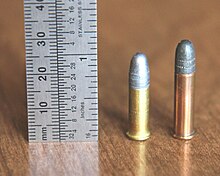.22 extra long
| .22 extra long | ||||||||
|---|---|---|---|---|---|---|---|---|
 .22 long rifle (left) and .22 extra long (right). | ||||||||
| Type | Rifle | |||||||
| Place of origin | United States | |||||||
| Production history | ||||||||
| Produced | 1880–1935 | |||||||
| Specifications | ||||||||
| Case type | Rimmed, straight | |||||||
| Bullet diameter | .223 in (5.7 mm) | |||||||
| Neck diameter | .225 in (5.7 mm) | |||||||
| Base diameter | .225 in (5.7 mm) | |||||||
| Rim diameter | .275 in (7.0 mm) | |||||||
| Rim thickness | .043 in (1.1 mm) | |||||||
| Case length | .750 in (19.1 mm) | |||||||
| Overall length | 1.16 in (29 mm) | |||||||
| Primer type | Rimfire | |||||||
| Maximum pressure (CIP) | 26,000 psi (180 MPa) | |||||||
| Ballistic performance | ||||||||
| ||||||||
| Source(s): Barnes & Amber 1972 | ||||||||
The .22 extra long is a .22 in (5.6 mm) American rimfire rifle and handgun cartridge.
Background
Introduced in 1880,[1] the .22 extra long was used in Remington, Ballard, Wesson, Stevens, and later (1916) models of Winchester's M1902 and M1904 single-shot bolt-action rifles,[2] as well as in Smith & Wesson revolvers.[2]
Using the same 40 gr (2.6 g) outside-lubricated bullet later adapted for the much more common .22 long rifle,[2] the extra long was loaded with 6 gr (389 mg) of black powder.[2] Originally, it slightly outperformed the .22 LR, but was "not noted for great accuracy",[2] while later smokeless loads achieved about the same muzzle velocity as the .22 LR.[citation needed]
As with the .22 Winchester Automatic[3] and .22 Remington Automatic,[4] the .22 extra long will not chamber correctly in .22 long rifle weapons.[2] Because it is very dimensionally-similar, however, the shorter .22 short, .22 long, and .22 LR will chamber in weapons designed for it[2] (in the same way a .38 Special cartridge can be loaded into a .357 Magnum revolver, or a .44 Special cartridge can be loaded into a .44 Magnum) revolver.[citation needed]
The power of the .22 extra long is comparable to the standard velocity .22 long rifle,[2] which is much more commonly chambered and sold.[citation needed]
The .22 extra long ceased to be offered commercially in 1935.[2]
See also
- .22 BB
- .22 CB
- .22 short
- .22 long
- .22 long rifle
- .22 Winchester Magnum Rimfire
- .22 Hornet
- List of rimfire cartridges
- 5mm caliber
- List of cartridges by caliber
- List of rifle cartridges
- List of rimfire cartridges
References
Notes
- Barnes, Frank C., ed. by John T. Amber. ".22 Extra Long", in Cartridges of the World, pp. 274, 282, & 283. Northfield, IL: DBI Books, 1972. ISBN 0-695-80326-3.
